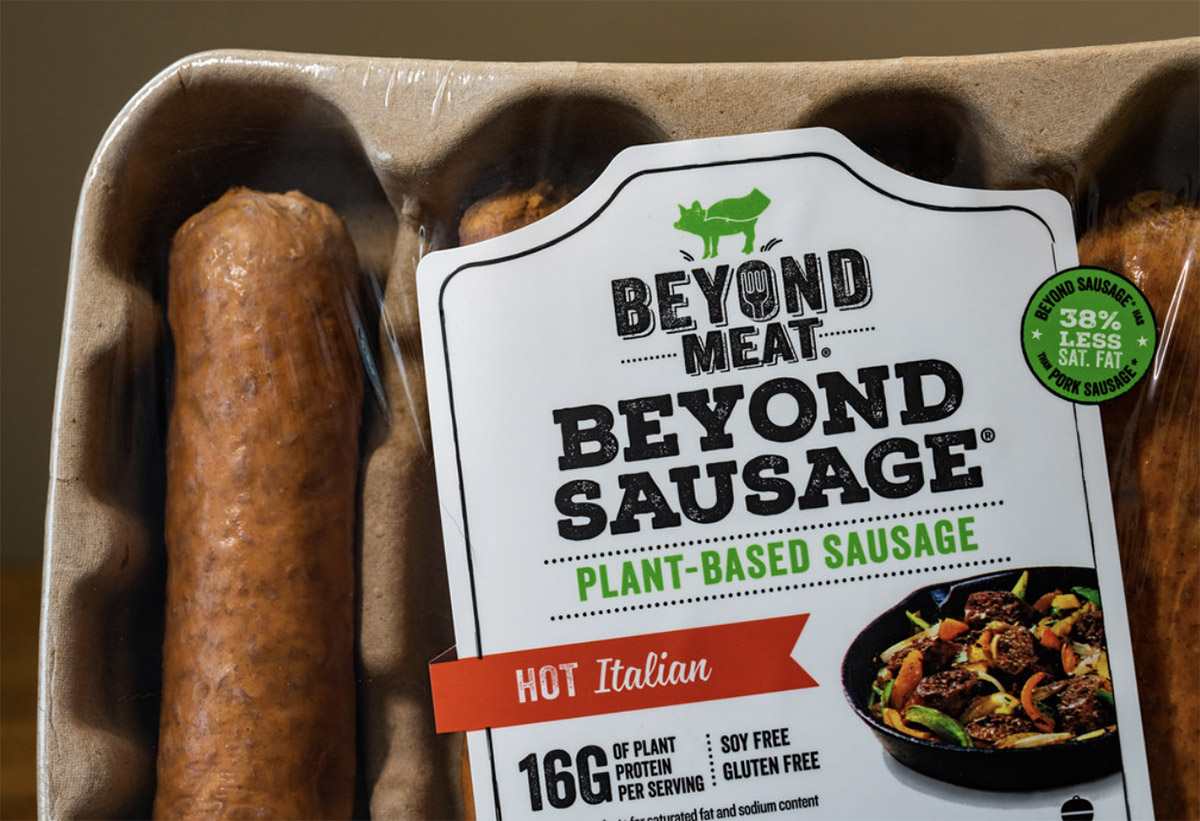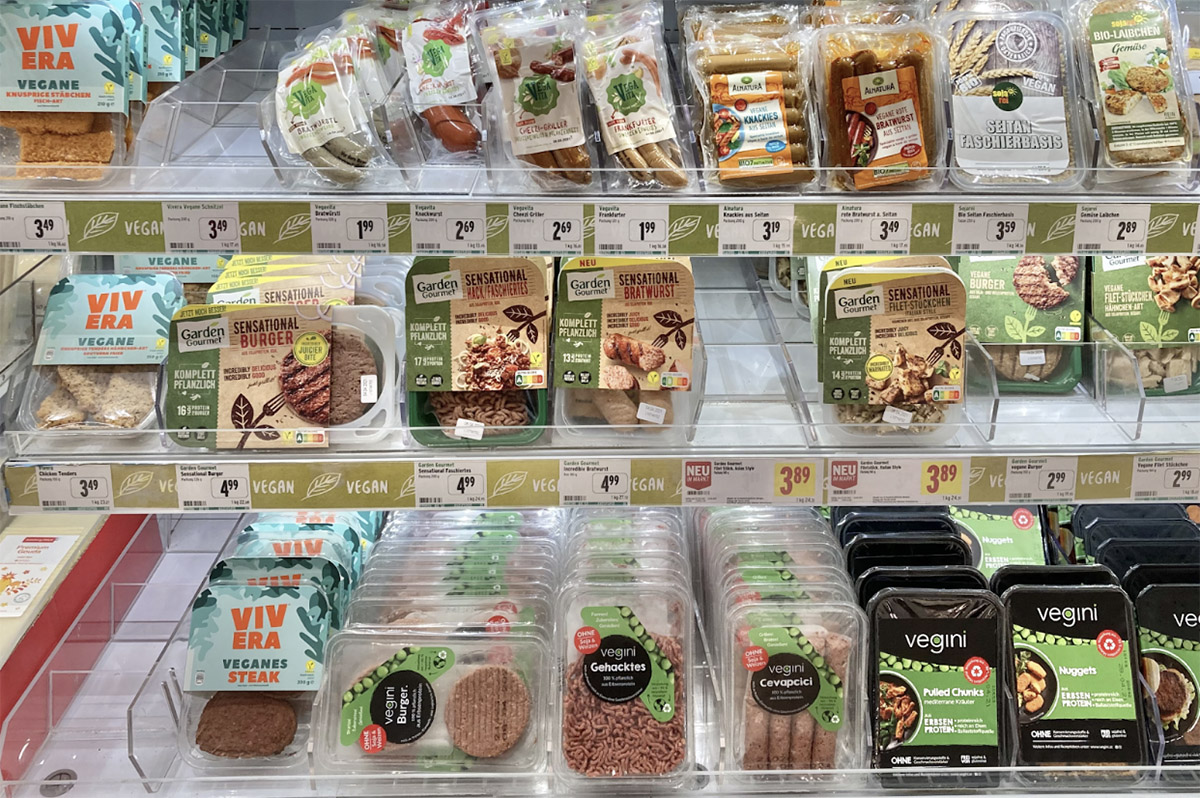January 18, 2023
Dropping share prices and poor sales reports have brought the plant-based industry under scrutiny in recent months. Has the protein transition stalled? Luke Wilkinson investigates.


Over the last few years, plant-based meat alternatives have been popping up everywhere; McDonald's has its plant-based burgers, KFC its plant-based chicken, and supermarkets all over the western world have begun stocking their own-brand versions of healthy, sustainable alternatives to mass-produced meat. It has been a revelation – a revolution, even.
But lately we have seen parts of the plant-based industry come under close scrutiny regarding sales and potential for future growth. It all begs the question: Is the plant-based industry declining?
“Firstly, US consumers are not buying as many meat alternatives as expected, and secondly, one of the biggest companies making meat alternatives appears to be rapidly losing value.”
For the pulse industry, this is an important question. Some of the world's biggest manufacturers of plant-based meat alternatives, such as Beyond Meat and NotCo, use yellow peas and other pulses to extract the protein around which their products are built. These companies’ rapid rise into mass manufacturing promised a transition to a brave new world in which plant-based ingredients and products would dominate the protein scene. Changing consumer diets meant plant-based brands needed to innovate and develop in order to match the growth of more sustainability-conscious attitudes.
Recent articles in the New York Times, Wall Street Journal, and other news outlets have appeared to throw cold water over some of the excitement around the plant-based revolution. At the heart of these stories are some hard facts: firstly, US consumers are not buying as many meat alternatives as expected, and secondly, one of the biggest companies making meat alternatives appears to be rapidly losing value. While meat alternatives are only one part of the plant-based product range, they are certainly an important segment at whose supposed failures it’s worth taking .a closer look.
Beyond Meat and Impossible Foods are the two biggest and most well-known brands around the world, and currently Beyond Meat, at least, is not profitable, posting a loss of $14.8 million in their third quarter financials. You may think, rightly, that young companies are often not profitable for several years of their early existence but Beyond Meat reportedly spends $1.70 for every $1 of product sold, recently laid off around 19% of its workforce, and its stock price has dropped around 80% in the last year. None of this suggests a company in a positive trajectory.
Meanwhile, Impossible Foods was set to take itself public in the third quarter of 2022 with valuations of up to $7 billion but its IPO has been delayed. It has also recently laid off 6% of its staff. Speaking to the New York Times this month, Impossible Foods communicated that sales have grown over 60% year on year, and that it is not feeling the same contractions of industry rivals like Beyond Meat.

NotCo, the largest South American plant-based food manufacturer has also cut 6% of its staff due to the ‘complex global economic scenario’.
A New Nutrition Business report about the plant-based industry’s perceived failures explains that, in a survey of 100 plant-based companies around the world, not one of them was profitable and that, at approximately 1.4% of US market share, the plant-based industry could still be considered a niche with overstated potential for growth from investors and the companies themselves.
It may also be true that the market is simply more saturated than it was before; research suggests that the number of people who want to buy meat alternatives has not changed, but that after several years of new companies coming into the industry, the consumer base has been spread more thinly.
With many countries around the world suffering from rising inflation, perhaps the worrying numbers above are not a surprise. In the US, research from Information Resources Inc. suggests that sales of refrigerated plant-based meat products had gone down by over 10% year-on-year as of September 4.
Does this suggest that people no longer want the product or is it just a storm that will eventually pass?
Christoph Vogel, Head of Market Segment Proteins and Ingredients at Bühler Group, a leading technology company offering protein value chain solutions, believes inflation and energy prices are certainly important for consumer choice: “Inflation and high energy costs, especially in Europe, also contribute to slowing sales volume of plant based meat alternatives, as the price of regular meat is often lower than plant-based alternatives.”
“Price parity is still predicted to be a major turning point for the plant-based meat industry and so far it has not been achieved.”
A recent Deloitte report suggests that consumer willingness to pay a premium for meat alternatives dropped nine percentage points from 2021. However, it is also important to note that the price of animal protein is rising rapidly, too. For example, beef prices are predicted to rise 15% in 2023.
“Price parity is still predicted to be a major turning point for the (plant-based meat) industry,” says Christoph Vogel, “and so far it has not been achieved.”
Should price parity be achieved soon, this could represent a significant boost for meat alternative products.
Another factor highlighted in the Deloitte report is that consumers may be beginning to question how healthy plant-based meat alternatives are, with consumer belief that the products were healthy dropping by eight percentage points from 2021.
Ultra-processed foods are foods made by deconstructing whole foods into their constituent chemical parts and then reformulating them using additives and preservatives designed to improve their longevity, taste, convenience, and cost. Most plant-based meat alternatives fall into this category as many processes are necessary to break down a raw material like yellow pea or soy and use that to create your average plant-based burger or mince.
In the New Nutrition Business report mentioned above, Julian Mellentin suggests that plant-based meat alternatives are suffering as a result of being in the ultra-processed category: "If you want to find product that is utterly in conflict with the food you find around the Mediterranean – the famous Mediterranean diet that we all know is so healthy – it's plant-based meat substitutes,” says Mellentin. "It's actually the case that a small, but growing percentage of consumers are motivated by ‘real’ food.”
‘Real’ food as a trend implies fresh, organic whole foods that have not been processed at an industrial level, which would include fresh fruit and vegetables, pulses, nuts and unprocessed meats. Plant-based meat alternatives will likely never be able to fit comfortably in this category. But should they need to be considered healthy?
As referenced on Foodnavigator.com, Unilever’s Health and Wellness Director, Amelia Jarman, doesn't believe that ultra-processed foods are unhealthy by default: “Processing per se isn't bad,” she suggests, “what is bad, is food that has no nutritional value."
This is the principal at work within companies such as the LiveGreen Group based in Chile, whose company the GPC profiled earlier last year. The LiveGreen Company uses artificial intelligence to compile solely natural ingredients and additives rather than chemical ones in order to create its meat and ice cream alternatives.
Not all bad news: Predicted growth overall & sustained demand
Much of the focus on the decline of a plant-based industry has been on the big brands that offer mostly burgers and mince substitutes but this product type alone does not make up the entire plant-based industry. An October report from Daedal Research suggests that the plant-based food market overall is set to grow at a compound annual growth rate (CAGR) of 17.52% between 2022 and 2027, with great optimism for the plant-based dairy segment, which currently makes up 60% of the market share.
The highest growth predicted over this period globally is said to be for plant-based egg alternatives. In the European plant-based food market, the report suggests that the pea segment is expected to grow at the highest CAGR between 2022 and 2029.
The good news for plant-based products (and also for the sale of dry and canned pulses) is that the demand for healthy plant-based protein is still high. More and more people are choosing to adopt vegetarian, vegan, and particularly flexitarian diets; one survey conducted by Danone concluded that 20% of American adults identified as either flexitarians or as reducing their meat intake overall. Approximately 5% of Chinese people, 20% of Mexicans, and up to 39% of Indians are vegetarian; if we assume that these numbers will continue to grow, then there should be no shortage of demand moving forward if the industry can successfully expand to those markets.

The good news for plant-based products is that the demand for healthy plant-based protein is still high.
It may also be true that the market is simply more saturated than it was before; research suggests that the number of people who want to buy meat alternatives has not changed, but that after several years of new companies coming into the industry, the consumer base has been spread more thinly.
Some plant-based companies are showing signs of continued success despite market volatility: Chilean giant NotCo is set to enter the American market in a cooperative venture with Kraft Heinz at the beginning of 2023, and the Spanish plant-based market leader Heura received €20 million in its most recent funding round in October, having nearly doubled its turnover year-on-year from €7.6 million in 2021 to €14.7 million in 2022.
The co-founder of Heura, Bernat Añaños Martínez, explained earlier in the year that the key to his business was to prioritize taste and texture in the product: “From the very beginning, we have said we are not here to create alternatives, we are here to create successors. In order to create successors you have to be better at everything – you cannot just tick some of the boxes, you have to tick all of them. That's why we put a lot of effort into finding a fat analog using olive oil to give us very juicy products that are also very good nutritionally.”
Heura is now available in 65% of the retail market in Spain and has seen rapid growth across Europe. It is a company that aims to replace meat entirely with better tasting options, and as such is keen to bring prices down to make their products as accessible as possible.
“We are an activist company,” says Añaños, “so we put a lot of effort into reducing pricing, even stretching it further than we really should, because we understand that the only way to accelerate this is to make it more democratic so that we reach more families - not just the elite, but the whole spectrum of families.”
Taste, texture, and price – these three qualities may be the three most important factors for plant-based companies when it comes to capturing the flexitarian consumers that will secure them greater growth in the future. As Dan Maglioccio, President of Danone Canada explained of plant-based alternatives, “This is food – it needs to taste good. This is food – it needs to be priced competitively."
It is said that the recently ended trial of the McPlant burger in the US showed that it was underperforming in sales. McDonald’s has publicly declared itself ‘delighted’ with the product. In the UK, the pilot was successful and the burger has become a permanent feature of the menu. This is a perfect example of where the industry stands – its future is conflicted and uncertain, a mixture of success and failures.
There are more and more people hoping to reduce their meat intake, and meat itself is becoming more and more expensive. These two drivers alone should push up demand for plant-based meat alternatives but if inflation is causing sales to drop, then consumer loyalty to these products is clearly still very dependent on price
If, as some have suggested, plant-based food has reached its ceiling in terms of the number of consumers it can reach, then perhaps we can deduce that the taste of meat alternatives has yet to surpass their animal counterparts. The taste and texture may not yet be capturing the flexitarians and meat eaters that these companies hope to convert into regular consumers, but it still can. Innovation is constant in the industry, with the development of eggs, ice creams, and even sushi over recent years.
The future of plant-based meats is conflicted and uncertain, a mixture of success and failures.
Christoph Vogel of Bühler Group feels positive about the sector's potential for growth: “ We are confident about the sector's continued growth, as part of the global need to address key sustainability issues. And this is only the beginning of the journey. When price parity is reached, and if texture as well as taste keep improving, the volume of plant proteins will continue to increase.
“For Bühler, plant-based proteins and products are still in the focus and part of the overall corporate strategy.”
Yellow peas are key, but not the only possibility. As the plant-based industry grows, the pulse industry will grow alongside it, especially as plant-based ingredient lists open up to using everything from chickpeas and mung beans to fava and lupin.
If plant-based meat alternative demand grows across the Americas, then the closest and biggest producer of yellow peas, Canada, is likely to benefit most, especially given the rising costs of fuel and transatlantic maritime freight. Meanwhile, the world’s largest yellow pea supplier, Russia, which is expected to move into pea protein processing in 2023, may be better placed to service the needs of European plant-based manufacturers.
Time will tell if the predictions of continued growth this decade come true. However, one year of bad sales for the big players is not necessarily a sign that the industry has failed overall. As long as innovation continues, the potential of plant-based proteins is enormous.

Plant based meat alternatives / protein transition / plant-based meat analogs / McDonald’s / KFC / Beyond Meat / NotCo / Impossible Foods / Christoph Vogel / Bühler Group / LiveGreen / Kraft Heinz / Heura
Disclaimer: The opinions or views expressed in this publication are those of the authors or quoted persons. They do not purport to reflect the opinions or views of the Global Pulse Confederation or its members.